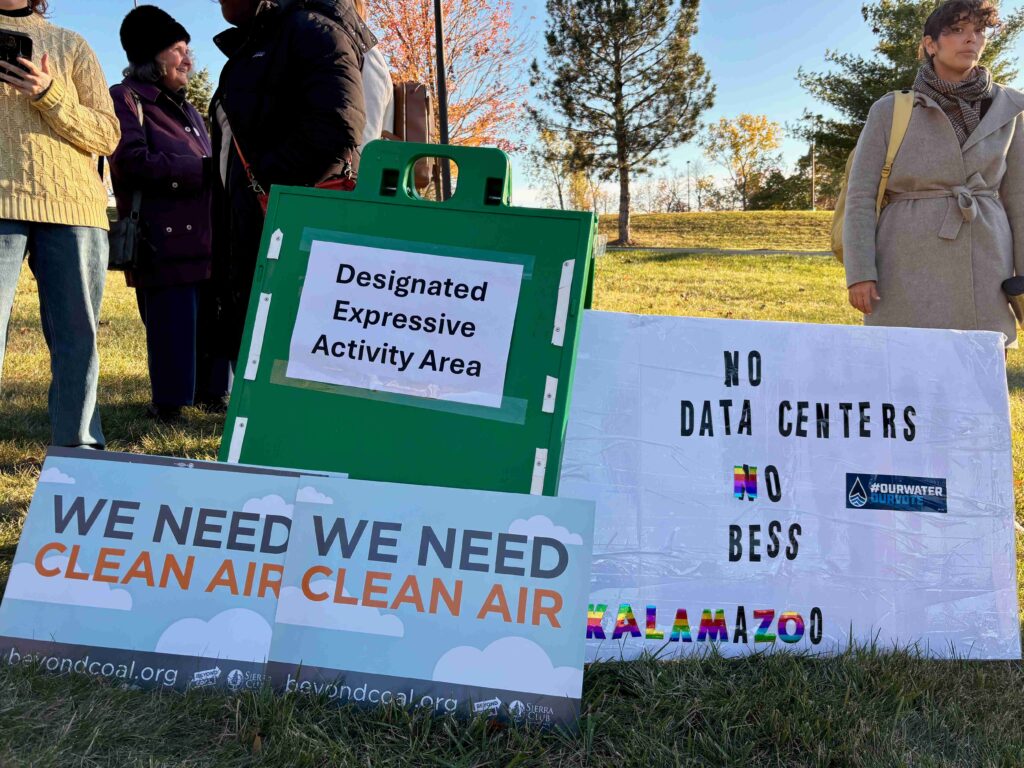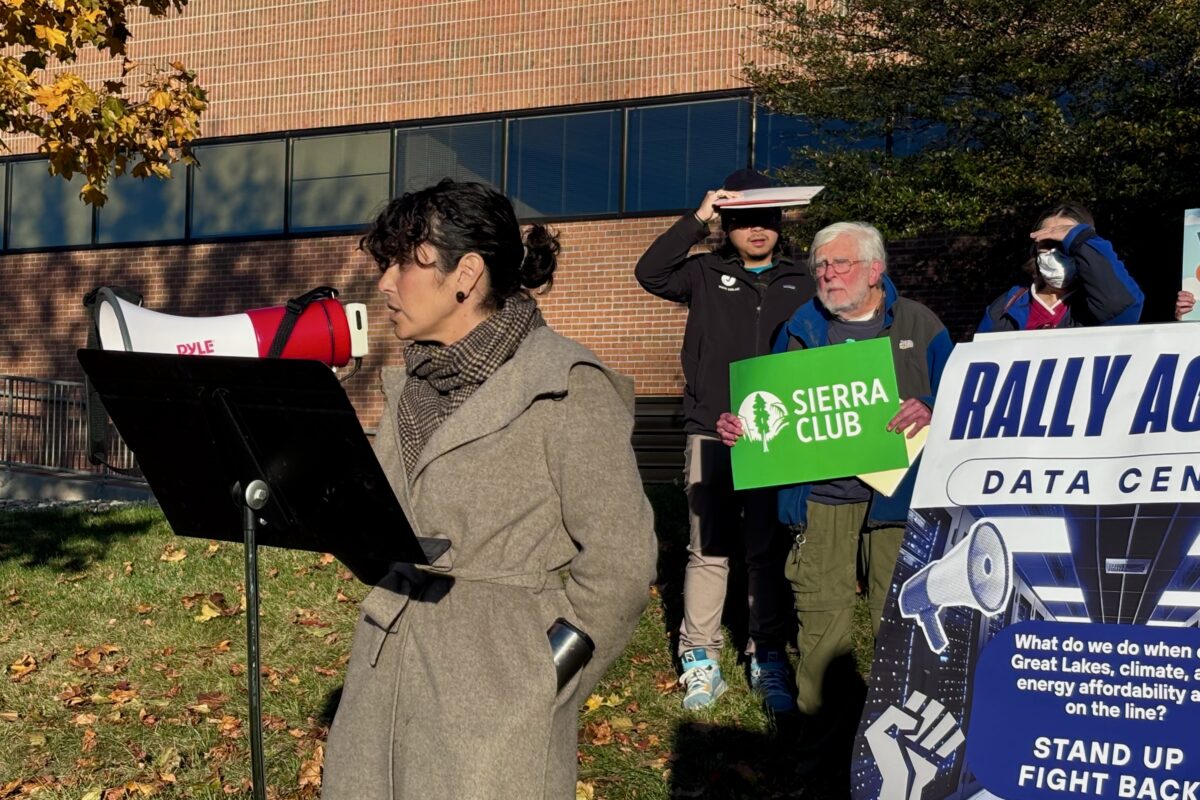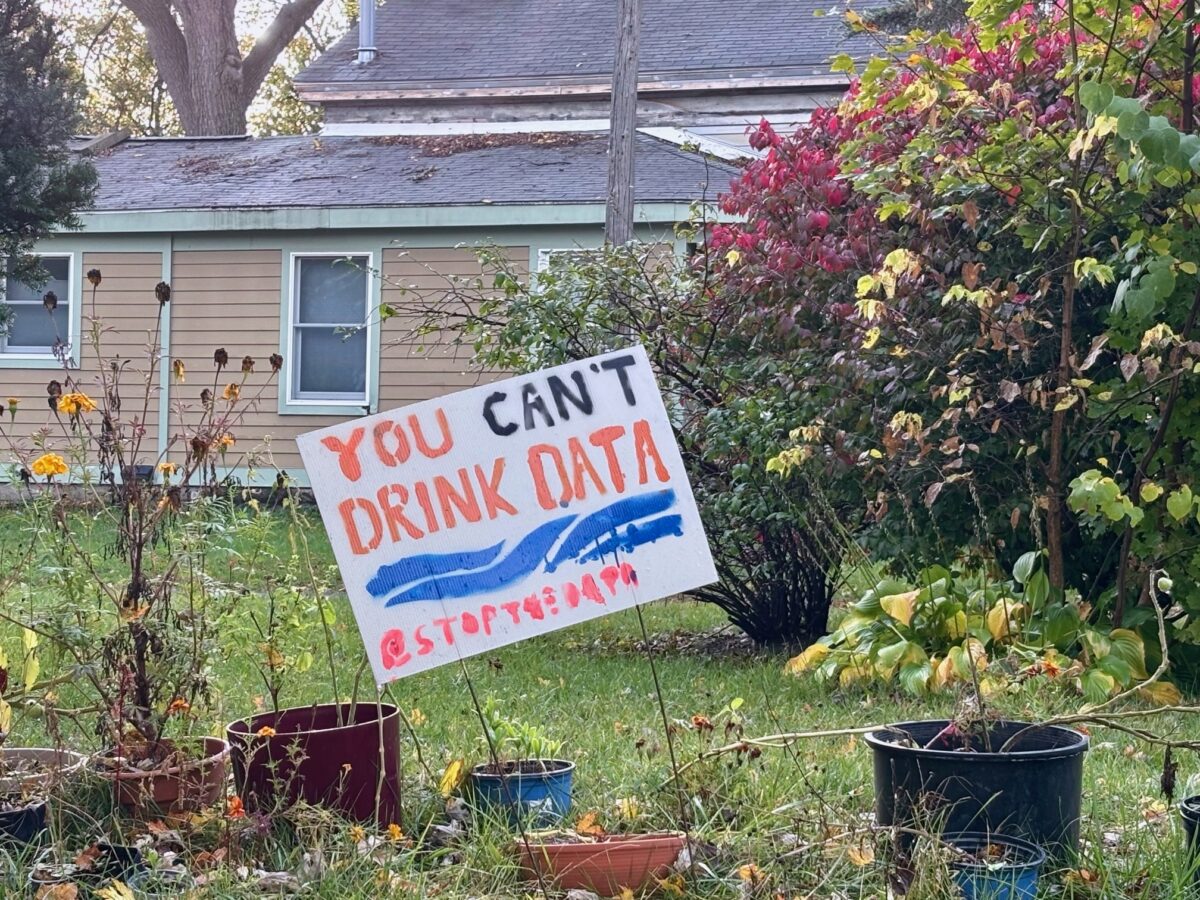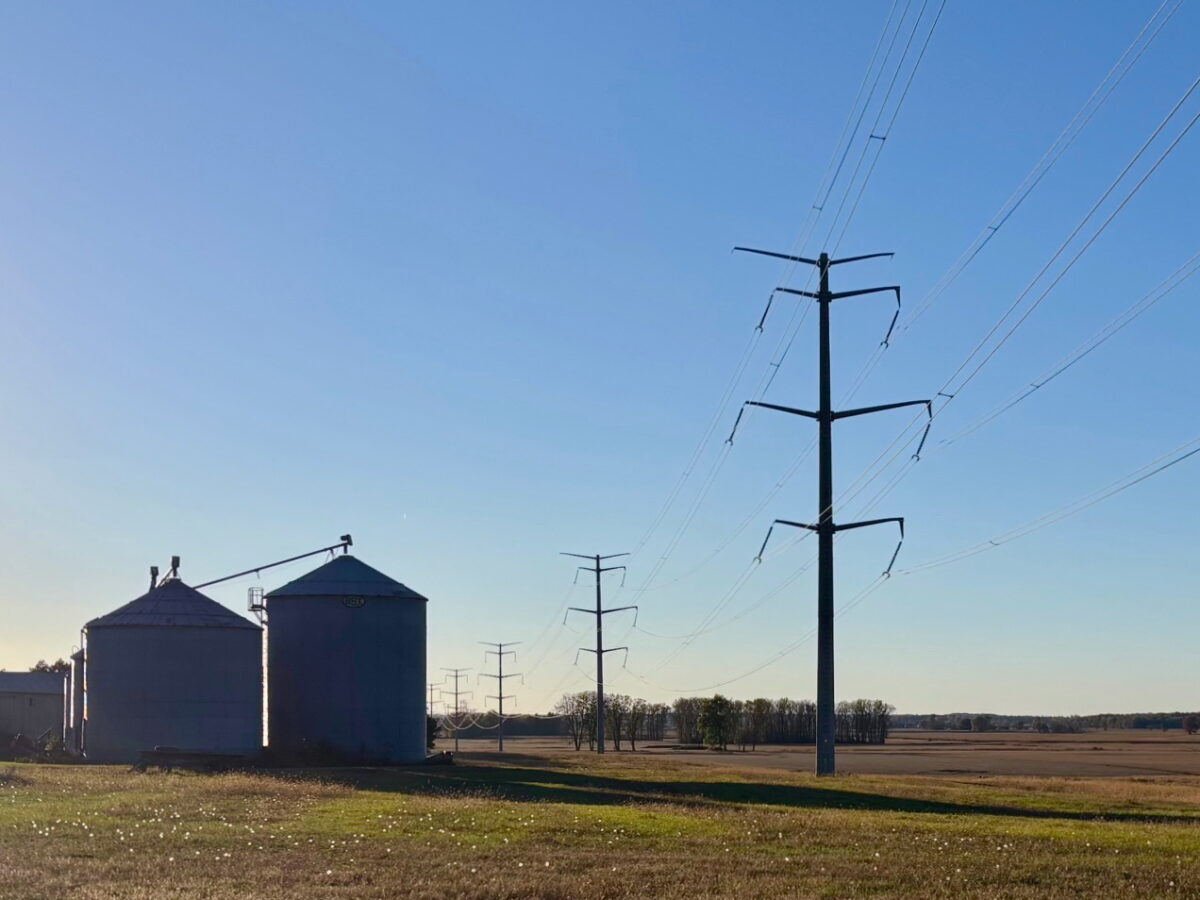Overview:
- Demonstrators call for data center protections before regulatory hearing in Auburn Hills.
- "This is lumpier than anything we've seen before, as we're talking about potentially gigawatts of additions," the chair of the Michigan Public Service Commission says of data centers.
- "We're here today to call on the Michigan Public Service Commission to protect Michigan families over tech billionaires," says environmental advocate Michelle Martinez.
A rally demanding officials do more to protect ratepayers from the costs associated with a potentially massive buildout of data centers in Michigan preceded a regulatory hearing in Auburn Hills Monday.
The Michigan Public Service Commission, which regulates utilities such as DTE Energy, held a hearing to review potential changes to its process for considering integrated resource plans, or IRPs.
Investor-owned utilities show in IRPs how they plan to meet customer power needs reliably and affordably over five-, 10-, and 15-year periods.
“Friends, it is spooky season, but the scariest thing in Michigan right now is AI data centers’ threats to the Great Lakes state,” Michelle Martinez, director of the University of Michigan’s Tishman Center for Social Justice and the Environment, told roughly 30 demonstrators who assembled before the hearing at the Oakland Community College Auburn Hills campus.
With DTE ratepayers already experiencing affordability issues and shutoffs, the MPSC needs to ensure big tech companies foot the bill for data center costs, Martinez said. She referenced a Bloomberg report that found data centers increased electricity costs by as much as 267% over five years in some areas.
“We’re here today to call on the Michigan Public Service Commission to protect Michigan families over tech billionaires,” Martinez said.
In comments to reporters before the event, MPSC Chair Dan Scripps said previous load growth has helped spread the grid’s fixed costs over more customers and improved affordability. Data center demand growth may be different, he said.
“This is lumpier than anything we’ve seen before, as we’re talking about potentially gigawatts of additions,” he said, adding that the projects will carry significant costs that could potentially be borne by other customers if the demand growth doesn’t materialize.
Utility plans should track data center costs: Sierra Club organizer
Speakers at Monday night’s rally and many of the commenters at the MPSC hearing warned water and power demands from data centers could hike energy bills, jeopardize Michigan’s climate goals, and harm its water resources.
Before the event, Bryan Smigielski, a campaign organizer with the Michigan Sierra Club, told Planet Detroit the nonprofit is advocating for the MPSC to require safeguards to protect residents from the costs of “stranded assets.” The term refers to scenarios in which investments in energy infrastructure are predicated on facilities that do not materialize, or go out of business.

The group also wants utilities’ long-term plans to include supplying data centers with renewable energy and new requirements for companies to provide an analysis to show how their IRPs could impact water resources.
The energy load growth and ratepayer impact from data centers could be immense.
Every 1-gigawatt data center could increase residential rates by 5%-10% without protections, Doulgas Jester, a consultant with 5 Lakes Energy who frequently contributes testimony in MPSC cases, previously told Planet Detroit.
Consumers is considering 15 GW of data center projects, while DTE has 7 GW of projects in its pipeline.
These projects would dramatically increase the utilities’ demand, which peaked at 7.5 GW for Consumers and 10.2 GW for DTE on the same day in 2022, according to the MPSC.
Data center development, primarily driven by artificial technology, could find itself caught in a speculative bubble or vulnerable to rapid shifts in technology, Smigielski said.
“AI energy demand could change drastically overnight with new software,” he said.
Utilities should include modeling in IRPs both with and without data centers, the Sierra Club organizer said.

Hearing spotlights climate, ratepayer, water concerns
Bloomfield Township resident Jane O’Neil worries energy demand from data centers will hurt the state’s renewable energy push, she told the MPSC.
“Will you retain the value of all the excellent climate saving legislation the Michigan House and Senate put into place just a few years ago … or will you blow by all of those savings and spend it all on AI and data centers?” she asked.
Michigan’s 2023 climate law, which set a goal of 100% clean generation by 2040, contains an “off-ramp” provision that could allow fossil fuel generation to stay online if there isn’t enough capacity to meet demand.
“Companies looking to expand data centers within Michigan for AI purposes need to do so in such a way that does not increase electricity bills of residents or strain our current electrical grid,” speaker Rachel Wolber told the commissioners.
She said companies need to commit to decades-long contracts and develop in a way that doesn’t harm Great Lakes water or other resources.
Andrea Pierce, policy director with the Michigan Environmental Justice Coalition, said data center developments could harm water resources, including aquifers and groundwater, by sending heated water into waterways or potentially discharging PFAS or other chemicals.
The Guardian reports that PFAS chemicals are used in data centers’ cooling equipment and in the production of semiconductors present in the facilities.
In response to a question before the event, MPSC Chair Scripps said the Legislature has not given the commission the authority to look at water issues.
“I’m not trying to diminish those issues; they’re obviously very important,” he said. “But we’re really just looking at the energy side.”
🗳️ Civic next steps: How you can get involved
Why it matters
⚡ How the Michigan Public Service Commission regulates the long-term plans of investor-owned utilities could determine the impact data centers have on Michigan residents’ utility bills, state climate goals, and water resources.
Who’s making civic decisions
🏛️ The Michigan Public Service Commission will decide on the new rules for utilities’ integrated resource plans, including how utilities will meet environmental rules and clean energy standards.
How to take civic action now
- 🌱 Follow The Sierra Club Michigan Chapter and Citizens Utility Board of Michigan for advocates’ viewpoints on MPSC activities.
- 📩 Submit a comment using the online form for the integrated resource plan docket. Or email the commission at mpscedockets@michigan.gov.
- ✉️ Mail Executive Secretary, Michigan Public Service Commission, 7109 W. Saginaw Hwy., Lansing, MI 48917. All comments should reference Case No. U-21867.
Civic impact
🌍 Submitting comments and contributing to official Michigan Public Service Commission testimony is one way you can help influence climate action and energy affordability decisions in the state.
⭐ Please let us know what action you took or if you have any additional questions. Please send a quick email to connect@planetdetroit.org.
MORE DATA CENTER COVERAGE
Ypsilanti City Council calls for halt to University of Michigan data center project
Ypsilanti council opposes University of Michigan data center with resolution that draws attention to potential environmental impacts and Los Alamos’ nuclear weapons work.
Saline Township settles with data center developer: ‘Lesser of two evils’
Facing a lawsuit from landowners and data center developer, Saline Township opts for a settlement that earmarks funding for the community.
Consumers Energy case sheds light on how Michigan data centers could hike your power bill
Michigan regulators are considering a Consumers Energy case that could indicate how the state plans to protect residential customers from potential price hikes caused by power-hungry data centers.





